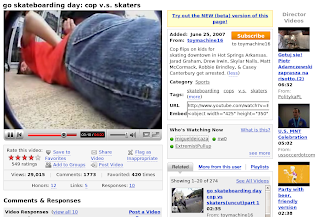For the first year of my involvement with the Jokosher project, one of the questions which came up often was: “Is Jokosher a Gnome application?”. This needed to be decided if we were going to include hard dependencies for Gnome libraries. On the other hand, we heard from a few users who didn’t run Gnome, and liked the fact that Jokosher didn’t drag in loads of dependencies. Of course the disadvantage here is less integration with the desktop. As far as I know, all the developers for the project run Gnome, so integration would be nice.
Eventually we decided that we are a Gnome application, but so far we have yet to add any hard dependencies. I have wanted to integrate Gconf for a while now, but I never find the time. Even though we don’t have the Gconf or GnomeVFS (now GIO) dependencies, we always felt as if we were part of the Gnome community. I mean our mailing list is at gnome.org.
I am a little late on this one, but everyone is talking about the awesomeness that is the Linux Hater’s blog. Last month the Linux Hater wrote a very nice article about how to write a Gnome application. This was a follow up to the very popular article: How to write a KDE application. Since I have never written a KDE application, I have no comment there. But I would like to see if Jokosher followed all the steps, so here’s my analysis:
Find some reasonable app from another platform (Windows, Mac, KDE, whatever, but preferably, Mac). Bonus points if there are already 3 other gtk-based alternatives who don’t want to integrate with Gnome.
We don’t really like to compare Jokosher to Apple’s Garage Band, but it does make it easier to explain the concept to people so I guess we are guilty of that. But I am glad to say the reason we started Jokosher is because there is no GTK+ multi-track audio editor (single track audio editors are totally different and don’t count).
You MUST have a g somewhere in the gname. Extra credit if you can make it a “gn”. If you can use “gnu” or “gno” or “gna” you’re are gnawesome, and your app is already worth using. Make sure the name of your app bears no relevance to what it actually does. Also, NEVER document if the g is pronounced with the hard-g sound.
People have told us that Jokosher is a ridiculously stupid sounding name, and yes it does not have any relevance to what the program does, but still there is no g.
Use at least two object frameworks. Three is even better. I mean the “O” in Gnome stands for object, after all. Take your pick from Corba/Orbit/Bonobo/D-bus. Make sure at least one of them works over the network, but make sure your app never actually uses it over the network.
Nope sorry. I really want to give Jokosher a DBus API, but I haven’t got around to it.
Remind yourself that OO in C is not so bad. assert(gtk_no_really_its_not_so_bad). Also, remind yourself that GTK+ is way better than Qt because it has no commercial company writing code for it. So, you know, it’s more free, or something, and it’s got a + in the name.
Phew, we escaped this one. We don’t have to use C because the entire program is written in Python. And we don’t use Qt because at least at the time PyQt and PyKDE were poorly maintained and lacked any community or documentation.
Generate wrappers for every conceivable language, but make sure none of them work exactly how you want. Inisist that your distros package each wrapper in a separate package.
Since we decided to write Jokosher in Python, we weren’t intending to write bindings for any other languages – especially C. This is more of a library thing anyway, not a desktop application thing.
Explain to at least three other programmers how glib doesn’t really have much to do with gnome. Because they care.
What is glib? All the types and data structures I use are the Python ones.
Don’t forget a Tango Icon!
This one is dead on. We had Tango icons before we had audio support, and we’re an audio application! But there’s no way you can argue this is a bad thing. Tango is great.
Make sure your app builds on windows, but looks like ASS.
We’ve been meaning to try this, but we have some ALSA specific code right now and no one wants to take on the challenge of compiling Gstreamer on Windows. I disagree with the ass part. If there’s one thing Jokosher does well it is look good!
Enumerate all the features you want your app to have.
Cut 90% of them. Because they’re hard to do. But tell everyone that they don’t actually need that feature.
Implement 2% of them. Hide the other 8% in gconf. Hide them well.
There are a lot of features we would like to do, but are very difficult both from an implementation perspective and a usability perspective. But given enough time we will get to them as long as we can find away to do it without crowding the interface. Despite what the Linux Hater says, it is sometimes better to leave a feature out than wreck the interface with it. Also I have been meaning to hide features in Gconf, but like I said I never got around to it.
Your interface must not have more than 4 buttons.
Each instrument in Jokosher has at least four button on it. Plus three more that appear in the selection context. Despite all the yelling there is a balance there between too many and too few buttons.
Make sure it depends on at least four other libraries with g’s in their name. That raises your apps’ gnomyness
Gstreamer, GObject (doesn’t really count cause its part of GTK+), Glade. That’s only two. Three if you count Gnonlin.
Don’t use Mono, because you are spreading your STD’s to everyone. No, wait, use Mono, because it will make you way insanely more productive. Wait, no, don’t use Mono, because if you do, some freetard distro that nobody uses won’t distribute your app.
No Mono, got it.
Depend on a module that is “heading toward planned deprecation” so that it will now be “at the end of the Obama presidency we will almost have consensus of heading toward a planned deprecation over 20 years.”
I don’t think we’ve ever done this. We started using Tango icons and Cairo graphics pretty early on so I think we are far enough past deprecation.
Ressure yourself that even if your app sucks, at least it follows the HIG.
Wow. What a perfect one to end with. I don’t think you could sum up Jokosher in a more controversial way than that. It’s true Jokosher sucks at what it is supposed to be good at, namely recording and mixing. Yes most of these are problems with Gstreamer that we haven’t managed to fix yet. And yes it sometimes doesn’t like your hardware and sends crazy opaque error messages. But many people have told us how much they like the interface, and we love giving it a lot of attention and polishing it up. We follow the HIG almost religiously. 100% guilty here. Damn.
Four or five out of fourteen depending on how you count it. Either way that’s a fail. So according to the Linux Hater, Jokosher is not a Gnome application. Let’s assume that’s a good thing.


